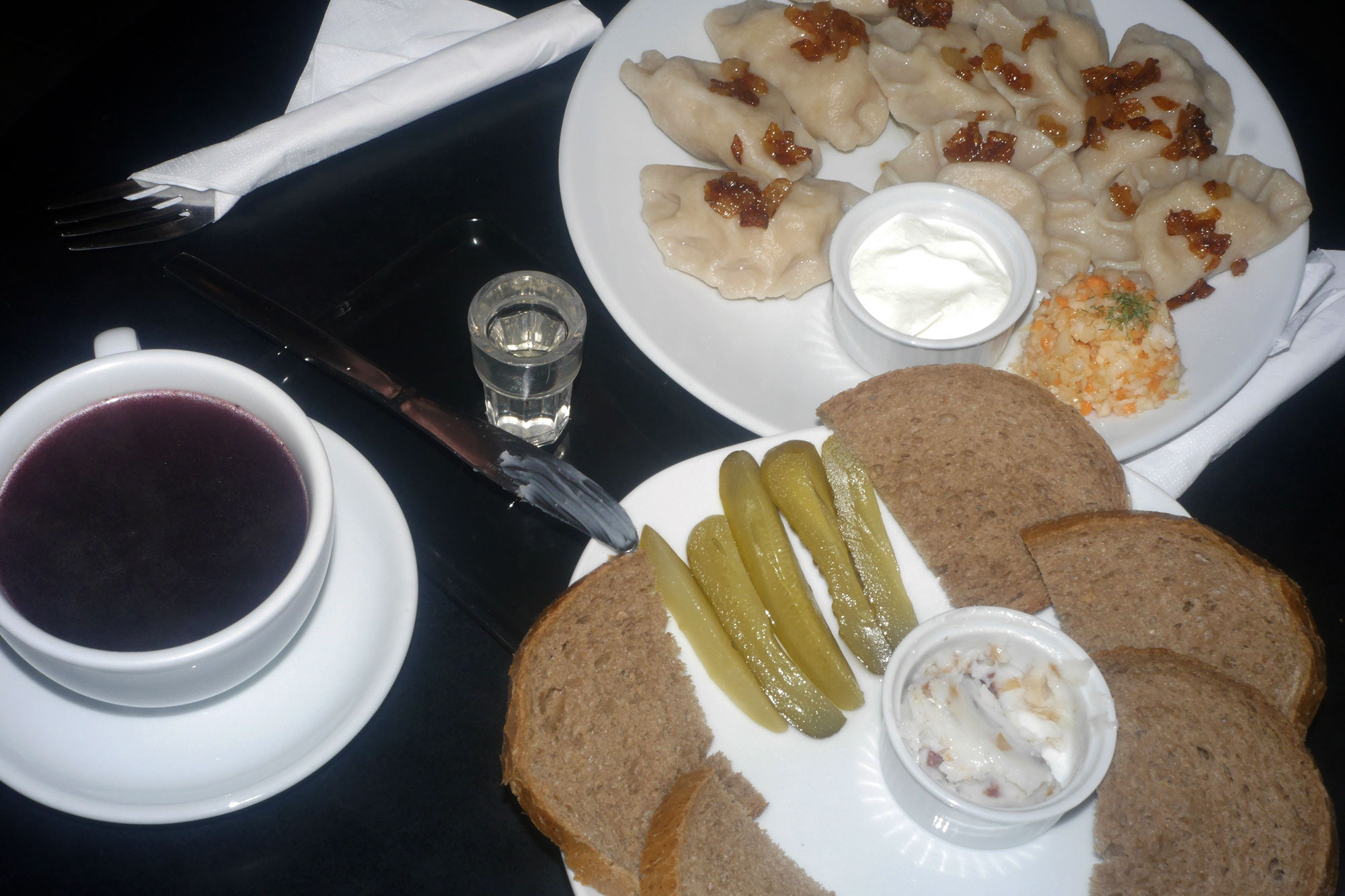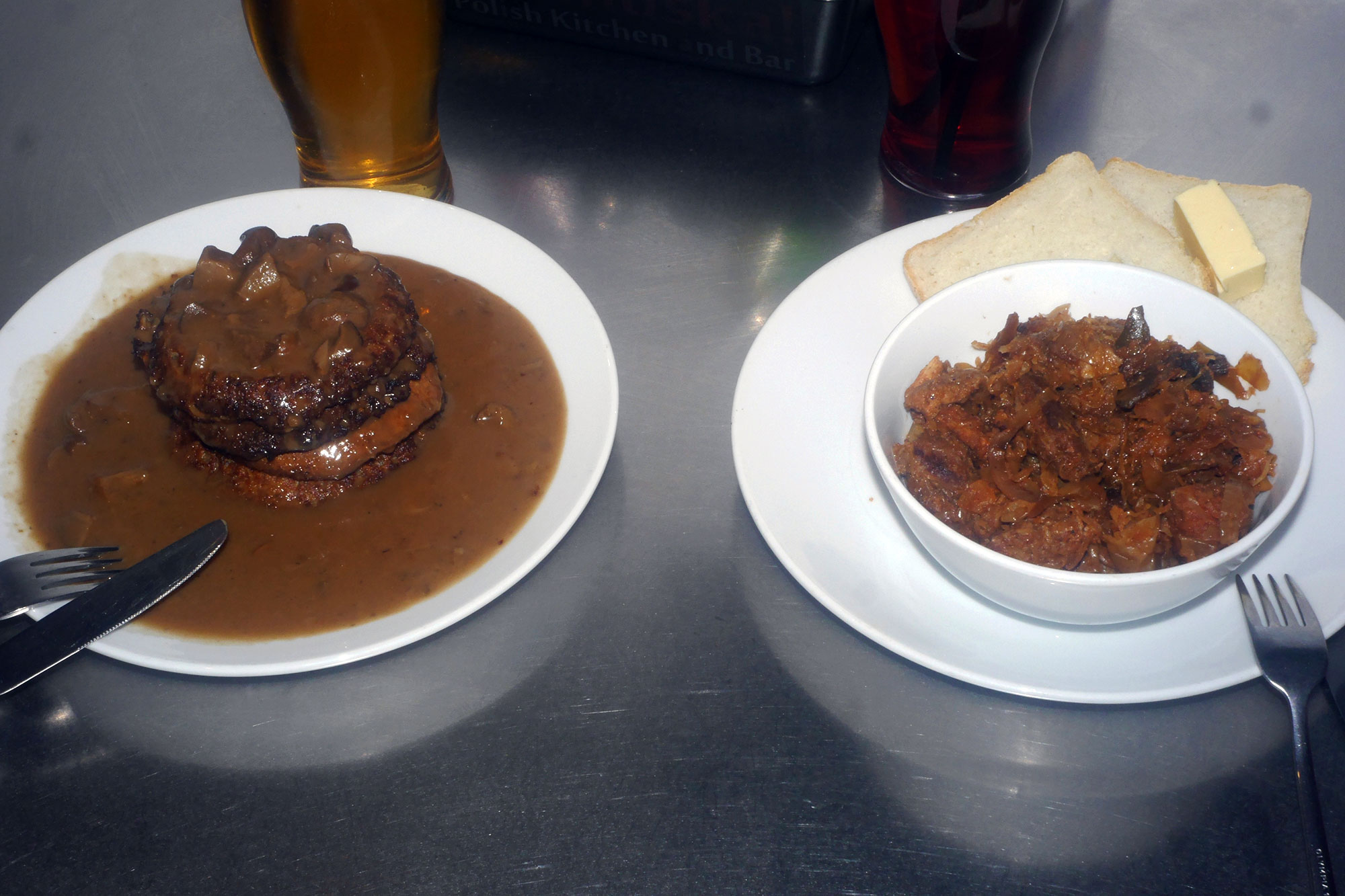This article originally appeared on VICE Poland.
There are thousands of Poles—like me—who live and work in the UK. Polish is Britain’s most widely spoken immigrant language and the number of Polish business events and entrepreneurial awards proves that the Polish construction worker is little more than a lazy stereotype.
Videos by VICE
Mass migrations influence the economics of a country, but also its food culture (there’s a reason why curry is the most popular dish in the UK.) Given the size of Britain’s Polish community, I figured that London must be home to some amazing (and cheap, since my fellow countrymen are not known for lavishly spending on eating out) Polish food. I set out to find it.
I start at somewhat contested North London food spot: Camden Market. The stalls sell food from all over the world—alongside a large selection of cyber goth outfits. My boss, who also happens to be Polish, had tipped me off about a stand famous for its pierogi, Polish dumplings. (The word “pierogi” is plural already, so no need for the additional “s.”)
Ignoring your superiors’ advice is never a wise choice, and I was curious to find out how Polish food stands up against Camden’s other food offerings. Unfortunately, after checking the whole market, I find absolutely no pierogi. Was my boss wrong? I ask other stall owners and it turns out that the Polish food spot disappeared last July, right after the Brexit vote.

Bar Polski in Holborn, Central London. All photos by Stanisław Legus.
Undeterred, I head to Holborn and find Polski Bar, a place that has been serving workers from nearby offices for years. The interior is simple and modern with a giant rooster on one wall, referencing the symbol found in Polish folk art. I find out that the owners used to run Polish music events, but there wasn’t must interest so they switched to focus on food and Polish wódka instead.
I start with a shot of Wyborowa vodka and its trusted yet somewhat forgotten companion of bread with lard and a Polish pickle (which, contrary to its British cousin, is never made with vinegar, relying instead on the natural fermentation process.) Then comes the beetroot soup borsch and—oh, how I’ve been waiting for this—pierogi served with fried onion and sour cream. Simple, homey, and delicious.
I notice that most of the traditional dishes at Polski Bar are served as finger food to go with beer, apparently as a way to suit British tastes. Making hearty Polish potato pancakes in tiny nibble-sized pieces with different sauces is certainly a novel idea.

Bread with pickles and pierogi, served with fried onion and sour cream.
The kitchen at Polski Bar is manned by Ms. Bożena, who comes from the once-industrial town of Łódź in central Poland. She loves her work and cooks exactly like she would at home (her daughter with whom she came to London has moved out, and she misses having someone to care for). The waiter, a Greek guy who has worked with Bożena from the very beginning, had never tried Polish food before taking the job. He recently visited Warsaw for the first time and fell in love with its milk bars, the classic Communist-era diners that serve cheap flour- and dairy-heavy dishes like crepes, dumplings, and yogurt drinks.
But it’s impossible to talk about Polish food in London without mentioning Mamuśka (Polish for “momma”), a restaurant near Elephant and Castle tube station. Part casual restaurant and part pub, Mamuśka has posters of phonetically written Polish words hanging on its walls and Polish league football matches are shown on large-screen televisions. (For many Poles, watching football is a favourite hobby, rivaled only by family barbecues and mowing lawns on the weekend.)

Borsch and bigos served at Mamuśka.
The food is served super fast and I get plenty of it for a good price. I have croquettes, borsch, bigos (a stew of sauerkraut and meat that gets better every time it’s reheated, as the legend says), and another serving potato pancakes, this time with mushroom sauce. In Poland, it would have probably been made with mushrooms gathered in the forest (another favourite pastime), but since we’re in London, we had to stick with champignons.
The quantity to price ratio is pretty amazing at Mamuśka, but the taste of the food … Well, it would satisfy a desperate Polish truck driver on the road. As those phonetic posters would say: food was SCHRE-DNYA-VE (not so good), but the wódka was still ZA-YEAH-BE-STA (fucking amazing).

Delikatesy Sówka, one of London’s many Polish shops.
As well as restaurants, London has many Polish shops. They’re easy to spot: just look for the flashy white and red exterior and a name that refers to the owner of the store or a family member. In my neighbourhood, we have two: Ola and Ania, but for this trip, I do some research and venture further to Delikatesy Sówka on Old Kent Road.
Most of Polish expats I know, regardless of their level of patriotism, can’t live without Polish produce. They’re often willing to travel extra miles just to get that tea brand they’ve been drinking since childhood (even if it happens to be Lipton). Three food items are particularly popular: cottage cheese, tinned pâté, and sweets, as well as beauty products (every Polish girl brings facials in tiny packages from home), and drugs (Theraflu, loads of it). In Sówka, I find all of these things—no surprise.
I also pick up some Łomża (a Polish beer brand), a carton of Krakus borsch, frozen Polish ravioli, and candy I remember eating as a kid. Sówka is also well stocked with artisan Polish goods like craft cheeses and kiełbasa sausages. The prices are decent: more expensive than my hometown but cheaper than the Sainsbury’s I usually shop at.
I chat with Sówka’s sales assistant and she tells me that sometimes, the odd person will come into the shop stare contemptuously at the staff. Nasty phone calls can happen too—someone recently called and shouted incomprehensible sentences spiked with the word “Brexit.”

Daquise Polish restaurant in West London.
The last place on my London Polish food tour list is the mysteriously named Daquise, a restaurant in Kensington that opened back in 1947. Its website is rife with name-dropping: apparently Roman Polanski once ate pierogi here and the first Polish president-in-exile was enthusiastic about their schabowy cutlet.
The vibe at Daquise is very folksy—many of the dishes come to your table still frying on a pan. I order some tartar (with wódka, of course) and herring in sour cream, both of which are simple yet amazing. And that schabowy? Oh boy. For many Polish people, schabowy is as important as Jesus Christ. The one at Daquise is no exception: crunchy, well seasoned, and served with a perfectly fried egg on top.
Leaving the restaurant full and happy, I conclude that it is completely possible to eat good, cheap Polish food in London. The diversity of Polish produce here reflects the diversity of Polish people who have made the city their home. While the aristocrats and soldiers of the first Polish immigration after World War II may have dined at Daquise, today’s expats will shop at Delikatesy Sówka after a busy day at work. It also made me happy to see so many non-Polish customers and diners at the places I visited.
I only hope that one day, Polish schabowy, pierogi, and borsch will be as popular in Britain as curry.
More
From VICE
-

CSA Images/Getty Images -

Illustration by Reesa -

Screenshot: GSC Game World -

Screenshot: Bethesda Softworks
